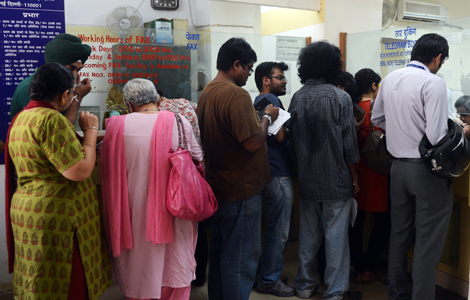Documenting the facts of life
Updated: 2013-07-15 07:26
By Han Bingbin (China Daily)
|
||||||||
Documentary fever has caught on in China, and China Education TV's latest program caters for the new groupies. Clear View will feature, all year round, a selection of 200 documentaries bought from the Public Broadcasting System in the United States.
PBS is known for its hard-hitting documentaries on social issues.
In the last few years, documentaries have enjoyed growing popularity in China, with national broadcaster CCTV launching an all-documentary channel in 2011. Several documentaries produced since then have aired to rave reviews, including CCTV's tome on food, A Bite of China.
What frustrates China Education TV producer Fang Jing is the sort of documentaries that currently hog the airwaves.
The Clear View producer feels that the genre is packed with documentaries on things that are far removed from reality - stars, planets, animals, and plants. The closest it gets is a few documentaries on history.
The former anchorwoman of CCTV's in-depth news section wants her program to be more down-to-earth, with a focus firmly grounded on realistic issues such as controversial news events and social problems.

In the last six months, Clear View has followed international news headlines, and presented documentaries on the mysteries surrounding Wiki-leaks, for example, and The News of the World phone-hacking scandal.
The best is yet to come, says Fang, and we can expect an investigation into how FBI, CIA and the Department of Homeland Security in the US works interdependently with each other, a production on subprime crisis and a four-episode documentary on the "Occupy Wall Street" movement where a China perspective is probably more relevant.
"I've seen a dozen of them. The overall quality, style and angling is a reflection of the producer's good taste," says Cui Wenhua, senior researcher at the Chinese National Academy of Arts, at a recent symposium.
At a time when intellectual resources could be shared globally, Cui adds, Chinese audiences can achieve a more rational worldview through watching documentaries that share an inspiring perspective on social reality.
"It's always interesting to watch how animals on the African prairie mate and breed, but watching it year after year will not forward our ability to understand society and the world," he says.
"The sharp and skeptical questioning in the documentaries will, to a large extent, inspire Chinese audiences to reflect upon their social realities."
In an attempt to "localize the presentation of the documentaries", Fang has interspersed personal commentaries at appropriate intervals to let Chinese viewers get a better background, or to explain certain situations.
Though this decision was not welcomed at times, Fang finds it quite necessary because Chinese audiences have different expectations compared to their Western counterpart.
Other than presenting the facts, Western media seldom offer an answer or conclusion during news reporting. Fang explains, Chinese audiences, on the contrary, seem to want a solution at the end.
Fang says she finds the way Chinese writers "localize" some original materials to be less than satisfactory.
For instance, they dub some sound bites, which mislead the audiences as they exaggerate the original intonation and often fail to keep pace with the interviewee's facial expression.
Fang plans to replace dubbing with subtitles or a more detached voiceover like that of a simultaneous interpreter.
Now in addition to being aired on Channel 3 of China Education TV, Clear View is also broadcast on Sohu.com, where it has been watched an encouraging 1.4-million times. On the original TV channel, however, the result is erratic.
"Honestly, it's risky to put it on a regular channel. It's probably better to run it on a more professional and niche platform, like a documentary channel."
But Jiang Yaojin, a manager of China Radio, Film and Television Newspaper, insisted in a public dialogue with Fang Jing that it's necessary to have quality documentaries on mainstream TV channels.
"TV stations have been very money-driven recently. Last year, singing competitions were very popular, and we saw a lot more this year. Few are now willing to slow down for productions with more individuality and higher taste," he says.
"For those who are doing it, please have patience even if the current audience ratings are not high. What I am afraid is that people give up first before they see the hope of success."
hanbingbin@chinadaily.com.cn
(China Daily USA 07/15/2013 page9)

 US star sprinter fails drug test
US star sprinter fails drug test
 Protests erupt after verdict
Protests erupt after verdict
 Color Run in London promotes healthy living
Color Run in London promotes healthy living
 Urumqi residents hand in weapons
Urumqi residents hand in weapons
 Pool jammed in summer heat
Pool jammed in summer heat
 Last stop for the telegrams of India
Last stop for the telegrams of India
 Heavy rain, strong winds as Soulik heads inland
Heavy rain, strong winds as Soulik heads inland
 8 dead, 19 injured after bus leaves road in Jinghong
8 dead, 19 injured after bus leaves road in Jinghong
Most Viewed
Editor's Picks

|

|

|

|

|

|
Today's Top News
Four GSK China execs held for investigation
Asiana survivors coping with post traumatic stress
China's Q2 GDP growth slows to 7.5%
Canada mourns victims of train accident
Air crash students return to families
Snowden says he won't release harmful US data
Local governments face financing woes
Zimmerman not guilty
US Weekly

|

|






